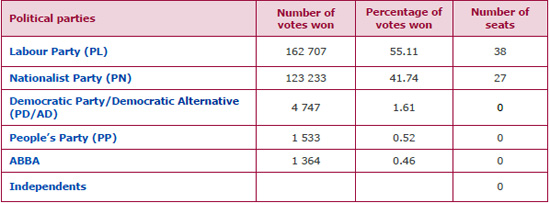Results
Elections in Europe
Corinne Deloy
-

Available versions :
EN

Corinne Deloy
The Labour Party (LP) of outgoing head of government, Robert Abela, which has been in power for nine years, won in the polls on 26 March in Malta, achieving its third consecutive victory after the 2013 and 2017 general elections. This is the first success for Robert Abela, who replaced Joseph Muscat as head of government in January 2020.
He won 55.11% of the vote and 38 seats (+1 compared to the previous election on 3 June 2017). The Nationalist Party (PN), led by Bernard Grech, obtained 41.74% of the vote and 27 seats (-1) and thus failed to close the gap with Labour.
Turnout, the lowest ever recorded in the archipelago since Malta's independence in 1974, was 85.68%, down 6.38 points compared to the general election of 3 June 2017. This is the first time since 1996 that turnout has been below 90%. However, the Maltese remain by far the most numerous among Europeans to go to the polls at every election, without any obligation to vote. Young people aged 16 to 18 were allowed to vote in these elections.
Results of the 26 March 2022 general election in Malta
Turnout: 85.68%

Source : https://electoral.gov.mt/ElectionResults/General
"The Maltese people have decided that the country must continue to move forward (...) The next government will be one of humility, and I will place particular emphasis on this notion when choosing the people, we choose to work with," declared Robert Abela after the results. The outgoing Prime Minister campaigned on his management of the health crisis following the coronavirus pandemic, rather appreciated by his compatriots if one believes the opinion polls, and on the economic record of his government. The archipelago's GDP growth rose to over 9% in 2021. Labour has provided significant support to individuals and businesses, kept unemployment low, frozen energy costs despite soaring prices, and not raised taxes (they promise not to do so for the next five years). The government has promised to spend €200 million to cushion the impact of the economic crisis, in addition to the €200 million already released to mitigate the effects of the recent rise in energy prices due to the war in Ukraine.
Robert Abela has been governing Malta since 13 January 2020. He succeeded Joseph Muscat, who was brought down after the arrest of businessman Yorgen Fenech, accused of complicity in the murder of Daphne Caruana Galizia, who was working on the Malta Files and who was killed by the explosion of her booby-trapped car on 16 October 2017 in Bidnija[1].
The outgoing head of government has taken steps to strengthen good governance, the rule of law and the freedom of the press and to democratise the archipelago's institutions. In particular, he removed the Prime Minister's power to appoint judges and the police chief. "Robert Abela has led in a difficult situation and that is why I think he has a lot of support. Between the conflict in Ukraine and the Covid-19 pandemic, people don't want to make the situation worse by adding political instability," said Andrew Azzopardi, a professor at the University of Malta.
For its part, the Nationalist Party campaigned on the denunciation of the assassination of Daphne Caruana Galizia and on corruption, which is very real in Malta.
Bernard Grech, its leader, accused the outgoing Prime Minister of "using public funds to influence the decisions and choices of his compatriots", explaining that no Maltese head of government had handed out cheques a week before the legislative elections, a practice that Bernard Grech described as "corruption". "Our democracy is at stake," the nationalist leader repeated during his campaign. However, the nationalists failed to convince the Maltese people of the need for political change and that they represented a real alternative political force. Nine years of opposition was not enough to unite them around a project. Internal tensions remain high within the main opposition party.
Robert Abela, 44, from Tas-Sliema, graduated in law from the University of Malta. A lawyer, he worked for his father's law firm (George Abela (PL), President of Malta (2009-2014)), where he specialised in labour law, family law, planning law and industrial law. He was first elected Member of Parliament in the parliamentary elections of 3 June 2017. In December 2019, he decided to run to succeed Joseph Muscat, who was forced to resign as head of government following revelations about the murder of Daphne Caruana Galizia, as leader of the Labour Party. He won the election on 12 January 2020 with 57.88% of the vote ahead of Chris Fearne (42.12%), while 92% of the party's members took part in the vote. Robert Abela was appointed Prime Minister of Malta the following day, on 13 January 2020.
The 26 March 2022 marks another success for him as the outgoing head of government managed to lead his party to victory.
On the same theme
To go further
Elections in Europe
Corinne Deloy
—
29 April 2025
Elections in Europe
Corinne Deloy
—
29 April 2025
Elections in Europe
Corinne Deloy
—
15 April 2025
Elections in Europe
Corinne Deloy
—
25 February 2025

The Letter
Schuman
European news of the week
Unique in its genre, with its 200,000 subscribers and its editions in 6 languages (French, English, German, Spanish, Polish and Ukrainian), it has brought to you, for 15 years, a summary of European news, more needed now than ever
Versions :




